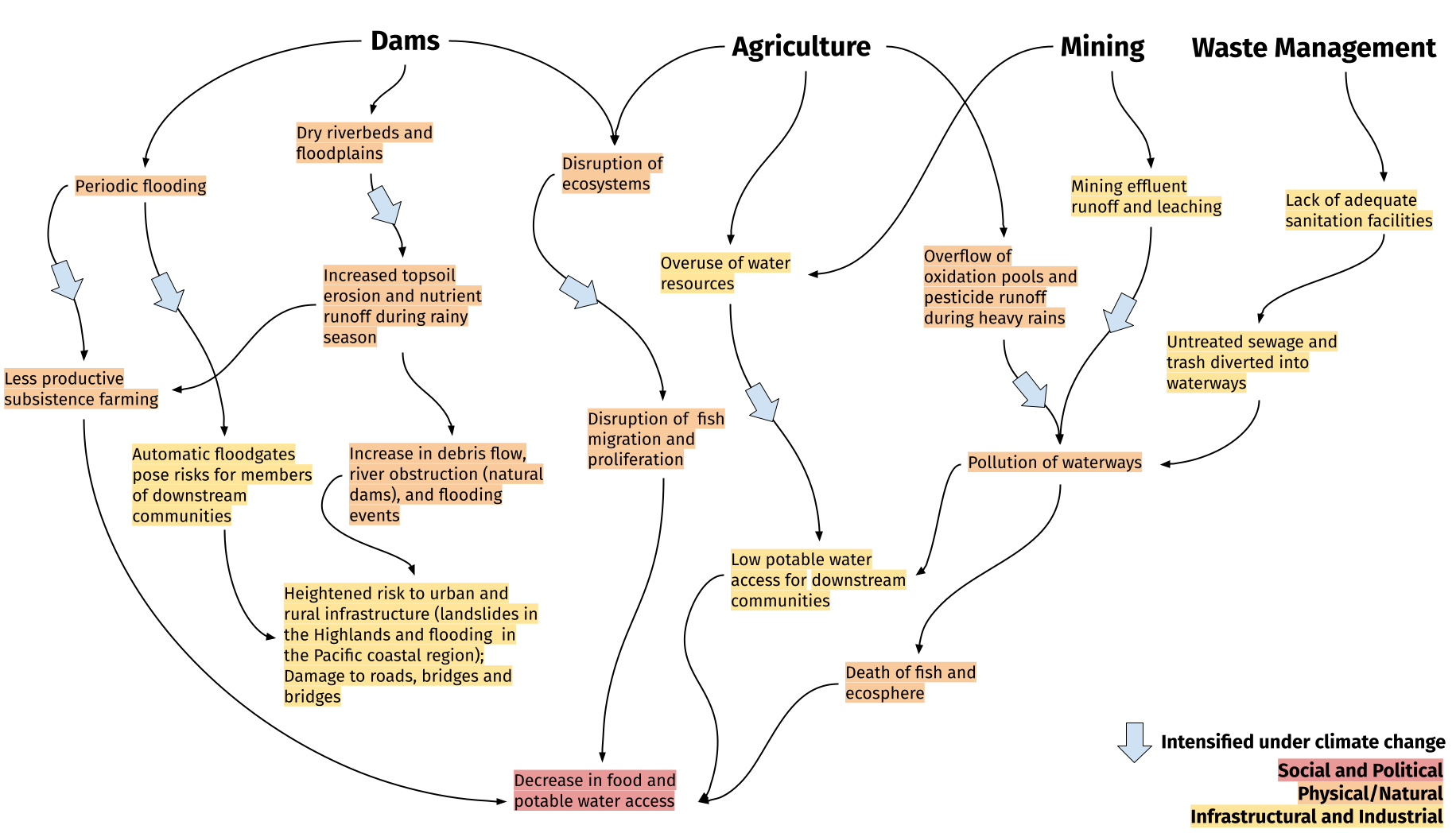Water Justice Lab
Latin America is home to countries experiencing some of the world’s earliest and most dramatic climatic changes, which have already begun to severely impact political and social institutions, ecosystems, and human health. At Region360, we believe that water justice is not only essential to human health and flourishing under a changing climate, but that it may also be a powerful avenue for mitigating climate vulnerability. With this in mind, our Water Justice Lab is working to characterize the relationship between water justice (a term inclusive of water quality, availability, and infrastructure) and climate vulnerability mitigation.
info@region360.org
Latin American Water Futures: Understanding and Mitigating Water Threats Under a Changing Climate
The overarching goal of Region360’s Water Justice Lab is to deliver educational materials and policy recommendations which can be used by local and regional leaders to mitigate threats to water security in Latin America. The Water Justice Lab works toward this goal by analyzing climate, social, and hydrological data to predict water futures, provide accessible information, and propose solutions for community and political leaders. Key to our mission is providing practically actionable recommendations which can empower local and political leaders throughout the region, including indigenous populations; this empowerment exists at the intersection of foreign and endogenous notions of justice, rights, and vulnerability, and the Water Justice Lab works carefully to synthesize a holistic account of these value-laden terms.
Expected Outcomes and Impacts
- Predicting and assessing regional water futures
- Providing accessible information to support decision-making at the local and regional level
- Adapting to and managing risk
- Improved disaster warning
- Proposing solutions
- Educating aspiring social hydrologists and change-makers with an interest in Latin American water security.
The Latin American Water Justice Lab positions Region360 as a leader in water resource education and policy recommendation for Latin America, particularly in equatorial countries, where highly variable rain patterns and storage strategies meeting a rapidly changing climate will determine water access and control for decades to come. It also positions the organization as a leading educator for young and early-career change-makers in the social hydrology of the region.
Research
Research in the Water Justice Lab is divided into three Pillars: Foundational Research, Synthesis of Data & Theory, and Education & Outreach. First, the development of foundational research, including analysis of the value-driven language of rights and justice; second, the synthesis of qualitative and quantitative data with tailored theories of water justice for each hydrosocial cycle studied; and third, outreach and education meant to arm current and future leaders with the knowledge needed to impart lasting social change.
Water Justice Lab Team

Shea Cheatham, Director
Shea is an Argentine-American with an M.S. in Earth Systems Sciences and an M.A. in Philosophy, both from Stanford University. As a graduate student, her work ranged from hydrodynamic modeling to environmental messaging and ethics. Now, Shea leads the Water Justice Lab at Region360, where she uses mixed research methods to generate informed water policy recommendations and educational materials. Her diverse experiences with quantitative and qualitative methods position Shea to be an effective analyst at Region360.
Pillar I
Foundational Research
1. Develop accounts of both international and endogenous notions of justice and equity, specifically as they pertain to the use of natural resources and climate change.
2. Determine variables which impact water equity, and build climate vulnerability models which center water equity.
3. Curate and Publish guided essential reading lists and case studies.
4. Holistic assess and synthesize various interpretations of water equity, justice, and fairness.
Pillar II
Synthesis of Data & Theory
1. Determine threats to water security and equitable distribution under a changing climate.
2. Map the overlap of water inequity and climate vulnerability overlap.
3. Clarify causal and correlative relationships between water inequity and climate vulnerability.
Pillar III
Outreach & Education
1. Develop training programs for research assistants, teaching them basics about sustainability in Latin America, as well as quantitative and qualitative research methods.
2. Publish technical and holistic reports to inform government, social, and international cooperation sectors.
3. Engage with community leaders and in comparative discourse.
4. Support stakeholders in the development and enactment of environmental and sustainability policies on an on-going basis as leaders in the sector.
Our Current Work: Mitigating Climate Change Vulnerability in the Northern Triangle Through Water Justice

Our current research project is centered on water equity in the Northern Triangle, a region which has always had extreme weather patterns, and with large populations vulnerable to changes in the climate. Most recently, we have worked to characterize the impact of four major water management systems in the country—dams, agro-business, mining, and waste management—on climate vulnerability. This characterization has demonstrated a cascade of intensifying climate change effects as a result of inequitable water distribution, but also suggests that water equity can and should play a dominant role in efforts to reduce climate change vulnerability. We believe that the promotion of water equity could have a multiplicative effect on climate resilience for the region—improving not only water availability, but also topsoil retention, ecosystem health, and more.
Region360 is a project of the Environic Foundation International (EFI) in Washington, DC. EFI enjoys special consultative status with UN’s ECOSOC and is a member of the UN’s Sustainable Development Solutions Network (SDSN).